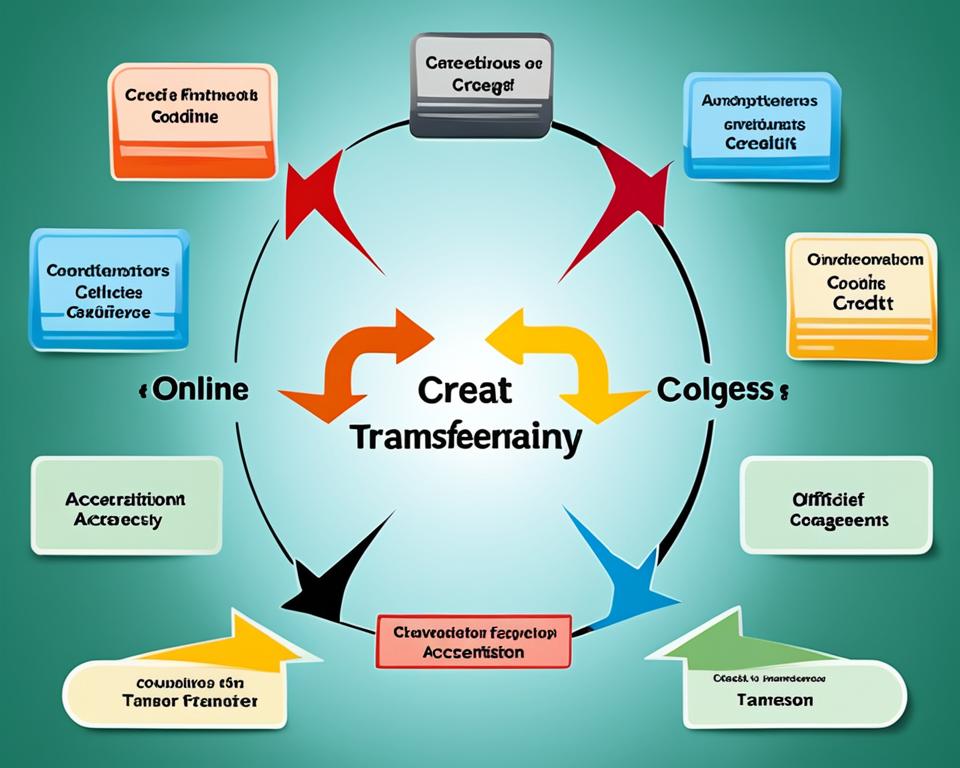In today’s digital age, online learning has become increasingly popular, offering flexibility and convenience for students. However, many individuals are unsure if they can transfer their hard-earned credits from online courses to traditional colleges or universities. The good news is that credit transfer is indeed possible, but certain requirements and considerations need to be taken into account.
Key Takeaways:
- Transferring credits from online courses to colleges or universities is possible, but it requires careful planning and research.
- It’s important to check the credit transfer requirements and policies of specific institutions before making any decisions.
- Regional accreditation plays a significant role in credit transfer and is generally easier to navigate compared to national accreditation.
- Factors such as minimum grade requirements, course load requirements, and the presence of articulation agreements can affect the transferability of credits.
- Creating a course plan, focusing on major degree programs, and earning high grades can increase the chances of successful credit transfer.
The Benefits of Online Education
Online education offers numerous benefits, making it an increasingly popular choice for students of all backgrounds. One of the key advantages is the flexibility and convenience it provides. With online learning, students have the freedom to study at their own pace and on their own schedule. This flexibility is especially beneficial for working adults who need to balance their education with job responsibilities and family commitments. They can access course materials and lectures anytime, anywhere, making online education a preferred option for those with busy lifestyles.
As the rise of online education continues, it’s important to note that the quality of learning is on par with traditional campus-based programs. Online courses and programs are designed and delivered by experienced educators who ensure that the same educational standards are met. Accredited online institutions provide equal educational quality, ensuring that students receive a rigorous and comprehensive education that is recognized by employers and other academic institutions.
“Online education offers the same level of educational quality as traditional campus-based programs.”
Today, employers are increasingly recognizing online degrees as valid and respected credentials. They understand that online learners possess the same knowledge and skills as their campus-based counterparts. Online education offers equal opportunities for career advancement and professional growth. Whether you earn your degree online or on a traditional campus, potential employers are more interested in the knowledge and skills you have acquired rather than the mode of education.
In summary, online education provides numerous benefits, including flexibility, convenience, and equal educational quality. With the rise of online learning, it has become the preferred choice for working adults and individuals with diverse responsibilities. Whether you are balancing work and family commitments or seeking career advancement, online education offers the flexibility and opportunities you need to achieve your educational goals.
The Flexibility of Online Learning
One of the most significant benefits of online education is its flexibility. Online courses allow students to learn and study at their own pace, removing the constraints of traditional classroom schedules. With online learning, there are no fixed class times or locations, providing students with the freedom to tailor their education to fit their individual needs.
The Rise of Online Education
Online education has experienced exponential growth in recent years. It has become a preferred choice for individuals seeking higher education due to its accessibility and convenience. The demand for online programs continues to rise as more students recognize the benefits and advantages it offers.
Accreditation and Transferrable Credits
When it comes to transferring credits, accreditaion plays a vital role in ensuring the smooth process. It is crucial to ensure that the credits come from an accredited institution. Accreditation acts as a stamp of approval, indicating that the institution meets certain quality standards and that its courses and programs are recognized and respected.
Regionally accredited schools are generally the easiest to transfer credits to and from. These schools focus more on academics and adhere to rigorous academic standards. Regional accreditation ensures that universities meet specific criteria, making the transfer process smoother and more straightforward.
On the other hand, national accreditation may have different standards and is often associated with trade or vocational curriculum. While the transferability of credits from nationally accredited schools is not impossible, it can be more challenging. Depending on the institution and its transfer policies, certain credits may not be recognized or may not transfer fully.
It is essential to note that regional accreditation is generally preferred and recognized by most colleges and universities. Regardless of whether the institution is online or campus-based, transferring credits from one regionally accredited institution to another ensures a higher likelihood of credit acceptance and transferability.
Benefits of Regional Accreditation:
- Recognized by colleges and universities across the country
- Greater assurance of the quality and rigor of academic programs
- Facilitates the transfer process
Please note:
Not all institutions have the same accreditation status. It is important to research the accreditation of both your current institution and the institution you plan to transfer to in order to understand their transfer policies and ensure a seamless credit transfer process.
In the next section, we will explore the various factors that can affect the transfer of credits from online courses to traditional colleges and universities.
Factors Affecting Credit Transfer
Transferring credits from online college courses to traditional colleges or universities can be influenced by several key factors. It is important to understand these factors in order to navigate the credit transfer process successfully.
Minimum Grade Requirements
One of the factors that can affect credit transfer is the minimum grade requirement. Most institutions require a minimum grade of 2.0 (out of 4.0) in a course for it to be transferable. This ensures that students have achieved a satisfactory level of comprehension and performance in the course before the credits can be transferred.
Course Load Requirements
Another factor to consider is the course load requirement for credit transfer. Some institutions may expect students to transfer a certain number of credits, typically equivalent to a full course load for two semesters. This ensures that students have completed a substantial amount of coursework that aligns with the requirements of the receiving institution.
Expiration of Credits
The expiration of credits is an important factor to keep in mind when considering credit transfer. Credits earned from a regionally accredited institution generally do not expire, regardless of how long ago they were earned. However, it’s essential to check the specific policies of the receiving institution regarding the validity and transferability of older credits.
Articulation Agreements
Articulation agreements between schools can significantly impact the transfer of credits. These agreements facilitate the transfer process and guarantee the acceptance of credits between participating institutions. It is crucial to be aware of any existing articulation agreements between the sending and receiving institutions, as they can streamline the credit transfer process.
| Factors Affecting Credit Transfer | Description |
|---|---|
| Minimum Grade Requirements | Most institutions require a minimum grade of 2.0 (out of 4.0) in a course for it to be transferable. |
| Course Load Requirements | Institutions may expect students to transfer a certain number of credits, usually equivalent to a full course load for two semesters. |
| Expiration of Credits | Credits earned from a regionally accredited institution generally do not expire. |
| Articulation Agreements | Agreements between schools that facilitate the transfer process and guarantee the acceptance of credits. |
Understanding these factors and researching the transfer policies of specific institutions can help students make informed decisions regarding credit transfer. By paying attention to minimum grade requirements, course load requirements, expiration of credits, and the presence of articulation agreements, students can maximize their chances of a successful credit transfer.

Tips for Successful Credit Transfer
When it comes to transferring credits, planning ahead is essential. By following these tips, you can increase your chances of a successful credit transfer:
- Create a comprehensive course plan: Align your course selection with the requirements of your desired transfer institution. This will ensure that the credits you earn are applicable to your intended degree program.
- Focus on major degree programs: While general education courses are important, prioritizing major degree program courses can enhance the transferability of your credits. Concentrating on courses directly related to your field of study increases the likelihood of credit acceptance.
- Earn high grades: Maintain a strong academic performance in your online courses. Higher grades demonstrate your dedication and competence, making you a more competitive candidate for credit transfer.
- Check for articulation agreements: Look for existing agreements between your current institution and the institution to which you plan to transfer. Articulation agreements make the transfer process smoother as they guarantee the acceptance of certain credits. Checking for these agreements can save you time and effort.
By implementing these tips, you can maximize the number of credits transferred and ensure a seamless transition to your new educational institution.
Comparison of Credit Transfer Policies
| Institution | Course Plan Alignment | Major Degree Program Focus | Grade Requirements | Articulation Agreements |
|---|---|---|---|---|
| University A | Flexible | Strong alignment | Minimum GPA 2.0 | Extensive agreements |
| University B | Strict | Partial alignment | Minimum GPA 2.5 | Limited agreements |
| University C | Rigorous | Varied alignment | Minimum GPA 3.0 | Specialized agreements |
Transferring Credits to National University
National University is a regionally accredited institution that offers a wide range of transfer-friendly degree programs. Whether you are transferring from a traditional campus setting or have online credits to transfer, National University can accommodate your needs.
At National University, transferring credits is made easy through their transfer credit calculator. This tool allows you to estimate the number of credits that may apply to your desired degree program. By entering your previous coursework, you can get an idea of how many credits will transfer, helping you plan your academic journey effectively.
With a focus on student success, National University understands the value of transfer credits in saving time and money. They strive to provide seamless credit transfer experiences, ensuring that you receive maximum recognition for your previous educational achievements.
Admissions counselors at National University are available to provide further information and guidance regarding credit transfer. They can help answer any questions you may have and assist you in navigating the transfer process smoothly.

Transfer-Friendly Programs at National University
National University offers a variety of transfer-friendly degree programs in various fields of study. Whether you are interested in business, education, healthcare, or technology, their transfer-friendly programs can help you continue your educational journey without starting from scratch.
Here are some of the transfer-friendly degree programs available at National University:
| Degree Program | Description |
|---|---|
| Bachelor of Science in Business Administration | This program prepares students for careers in business leadership and management. It covers topics such as marketing, finance, and strategic planning. |
| Bachelor of Arts in Psychology | This program explores various aspects of human behavior and mental processes. It offers a solid foundation for students interested in counseling, social work, or research. |
| Bachelor of Science in Nursing | This program is designed for registered nurses looking to advance their careers. It focuses on leadership, critical thinking, and evidence-based nursing practice. |
| Bachelor of Science in Computer Science | This program equips students with the skills and knowledge needed for a career in computer science. It covers programming, data structures, algorithms, and software development. |
These are just a few examples of the transfer-friendly degree programs offered at National University. To explore more options and find the program that aligns with your career goals, it is recommended to visit their official website or contact their admissions counselors for personalized assistance.
Transferring Credits to Online Colleges
Transferring credits to online colleges offers a flexible and convenient pathway to completing a bachelor’s degree. Online colleges understand the needs of nontraditional students, including working adults who have previously earned college credits. These institutions are often more accepting of transfer credits, making it easier for students to continue their education without starting from scratch.
Students who have completed courses at community colleges, including those within associate degree programs, will be pleased to know that online colleges generally recognize these credits. By transferring these credits, students can streamline their credit transfer process and optimize the time and effort invested in their education.
Completing an associate degree before transferring to an online college is a strategic move that enhances the credit transfer process. Associate degrees provide a solid foundation of knowledge and demonstrate academic achievement. By completing an associate degree, students can further strengthen their chances of credit transfer and smoothly transition into a bachelor’s degree program at their chosen online college.
When considering transferring credits to online colleges, it is essential for students to research each institution’s transfer credit policies and specific degree programs. This research ensures that students align their previous coursework with the requirements of their desired bachelor’s degree program, maximizing credit transfer and accelerating degree completion.
Benefits of Transferring Credits to Online Colleges:
- Flexibility: Online colleges provide the flexibility and convenience needed for nontraditional students to balance work, family, and educational commitments.
- Acceptance of Transfer Credits: Online colleges are generally more accepting of transfer credits, allowing students to build upon their previous educational experiences.
- Bachelor’s Degree Completion: With generous transfer credit policies, online colleges enable students to complete their bachelor’s degree in less time.
| Online College | Transfer Credit Policies | Maximum Number of Transfer Credits | Degree Programs Offered |
|---|---|---|---|
| National University | Accepts transfer credits from regionally accredited institutions | Varies based on individual evaluation | Wide range of transfer-friendly degree programs |
| University of Phoenix | Accepts transfer credits from regionally and nationally accredited institutions | Up to 90 credits | Diverse selection of bachelor’s degree programs |
| Southern New Hampshire University | Accepts transfer credits from regionally accredited institutions | Up to 90 credits | Extensive array of online bachelor’s degree programs |
Transferring credits to online colleges provides an excellent opportunity for students to continue their education and achieve their academic goals. With the flexibility of online learning and the acceptance of transfer credits, students can complete their bachelor’s degree, build upon their previous coursework, and advance in their chosen career paths.
Transferring Credits to Traditional Universities
Transferring credits from online courses to traditional universities requires careful consideration due to specific transfer policies and course equivalencies. Traditional institutions have established guidelines for credit acceptance, often requiring course equivalencies to determine transferability. To initiate the credit application process, you may be required to submit official transcripts, provide proof of college accreditation, and present a letter from your current college.
It is crucial to communicate with the admissions office of your desired traditional university to understand their specific credit transfer requirements. They can provide valuable information and guidance on the credit application process, ensuring a smooth transition to their institution.
In order to maximize your chances of credit transfer, it is essential to conduct thorough research and gather all necessary documentation in advance. By adhering to the transfer policies and requirements of the traditional university, you can increase the likelihood of a successful credit transfer and continue your education seamlessly.
Key Points:
- Transferring credits to traditional universities requires careful consideration of specific transfer policies and course equivalencies.
- Traditional institutions may require course equivalencies to determine credit acceptance.
- The credit application process may involve submitting official transcripts, proof of college accreditation, and a letter from your current college.
- Communication with the admissions office of the desired traditional university is crucial to understand their specific credit transfer requirements.
In the upcoming section, we will explore the process of transferring credits from online classes to state universities, highlighting potential difficulties and limitations, as well as the importance of consulting with admissions offices for guidance.

Transferring Credits from Online Classes to State Universities
Transferring credits from online programs to state universities may come with some difficulties and limitations. State universities often have specific course requirements that need to be met, which can make the credit transfer process more challenging compared to transferring from traditional programs. These requirements may include completing certain prerequisite courses or earning a minimum grade in specific subjects.
Differences in curriculum and credit limits between online programs and state universities can also impact the transferability of credits. Some courses from online programs may not align perfectly with the curriculum of state universities, making it more difficult to transfer those credits. Credit limits at state universities may also restrict the number of credits that can be transferred, potentially affecting the progress towards a degree.
“Transferring credits from online programs to state universities requires careful consideration due to the variations in course requirements and credit limits.”
It is essential for students considering credit transfer to consult with the admissions offices of both the online program and the state university. Admissions counselors can provide valuable guidance on credit transfer options and requirements, helping students navigate the process more effectively. They can also assist in determining if specific online courses meet the necessary criteria for credit transfer to the state university.
Benefits of consulting with admissions offices:
- Clarifies the credit transfer process
- Provides information on specific course requirements
- Guides students in creating a transfer plan
- Offers insights on the maximum number of transferable credits
- Ensures progress towards a degree is optimized
By consulting with admissions offices and understanding the specific requirements and limitations of credit transfer, students can make informed decisions about their academic journey. This consultation ensures that they can maximize their transfer credits and progress towards their desired degree at a state university.
Comparison of Transfer Credit Policies
| State University | Course Requirements | Credit Limit | Consultation with Admissions Office |
|---|---|---|---|
| University A | Minimum grade in prerequisite courses | Up to 90 transferable credits | Recommended for detailed credit evaluation |
| University B | Completion of general education courses | Up to 60 transferable credits | Encouraged for course alignment clarification |
| University C | Matching course curriculum | Up to 75 transferable credits | Required for credit transfer evaluation |
This table provides an overview of the credit transfer policies at different state universities. It highlights the course requirements, credit limits, and the importance of consultation with the admissions office. It is crucial for students to research and understand these policies to facilitate a smooth and successful credit transfer process.
Types of Transfer Credits Accepted by Online Colleges
When transferring credits from previous college coursework to online colleges, there are various types of transfer credits that are commonly accepted. Online colleges recognize that learning can happen in a variety of contexts, not just within the confines of a traditional classroom. Here are the different types of transfer credits that online colleges often accept:
- Exam or Test Scores from Recognized Testing Organizations: Online colleges may accept exam or test scores from recognized testing organizations, such as Advanced Placement (AP) exams, College Level Examination Program (CLEP) exams, or International Baccalaureate (IB) exams. These scores can demonstrate proficiency and knowledge in specific subjects, allowing for the transfer of college credits.
- Professional Experiences: Online colleges may recognize the value of professional experiences and consider them as transferable credits. This can include work-related training, certifications, or achievements that demonstrate expertise and relevant skills in a particular field of study.
- Military Training Credit: Online colleges often have programs in place to evaluate and award credits for military training, including courses completed during military service. This recognizes the skills and knowledge gained through military experience and allows service members and veterans to accelerate their degree completion.
- Pre-Evaluated Learning: Some online colleges offer pre-evaluated learning options where students can earn credit for completing specific courses or programs from accredited providers. These pre-evaluated courses have been reviewed and approved by the college, ensuring that the learning outcomes align with their curriculum.
- Portfolio Credit: Online colleges may accept portfolio credit, which is credit awarded for demonstrating mastery of specific subject areas through the submission of a portfolio. A portfolio typically includes examples of work, projects, or artifacts that showcase the student’s skills and knowledge in a particular field.
It’s important to note that each online college may have its own policy regarding the acceptance of these types of transfer credits. Therefore, it is advisable to research the transfer credit policies of individual institutions to determine the specific types of transfer credits they accept.
Determining Transfer Credits at Online Colleges
The determination of transfer credits at online colleges can vary depending on the institution. Each college has its own set of guidelines, often following regional or state requirements. Understanding these guidelines is essential to ensure a smooth credit transfer process.
Credits that are eligible for transfer typically must come from accredited institutions, either regionally or non-regionally accredited. Regional accreditation is generally preferred as it ensures that the institution meets specific academic standards. However, some online colleges may accept credits from non-regionally accredited institutions as well, depending on their transfer credit policies.
The number of credits accepted, credit requirements, and grade point average (GPA) criteria can also vary. Online colleges may have specific credit transfer policies that dictate the maximum number of credits that can be transferred. Additionally, most institutions require a minimum GPA for transferred credits to be accepted.
Transfer credits are often evaluated based on subject matter alignment, prerequisites, level, and laboratory requirements. Online colleges aim to ensure that the content of the transferred course aligns with the curriculum of their own programs. Prerequisites, such as specific courses or knowledge, may also be considered to determine transferability. Some institutions may have additional requirements, such as lab work or practical experience, for certain fields of study.
To maximize credit transfer at online colleges, it is crucial to understand the specific transfer credit policies of each institution. This can usually be found on the college’s website or by contacting their admissions office. By being aware of these guidelines and requirements, students can better prepare themselves and increase their chances of a successful credit transfer.
Conclusion
Transferring credits from online courses to colleges or universities is an accessible option for students, provided they carefully plan and research the process. Maximizing credit transfer involves understanding the transfer policies of the desired institution, maintaining a high grade point average, checking for articulation agreements, and creating a course plan that aligns with major degree programs.
By researching individual institutions, students can gain valuable insights into credit transfer requirements and increase their chances of a successful transfer. Planning ahead and selecting courses that meet the necessary criteria for credit transfer can significantly streamline the process.
It is important to note that transfer policies can differ between schools, so thorough research is essential. Paying attention to the accreditation of both the sending and receiving institutions can also affect credit transfer eligibility. Remaining proactive and seeking guidance from advisors can help students make informed decisions and ensure a seamless continuation of their education journey.
FAQ
Can I transfer credits from online courses to traditional colleges or universities?
Yes, it is possible to transfer credits from online courses to both traditional colleges and universities. However, there are certain requirements that need to be met, such as accreditation and minimum grade point averages.
What are the benefits of online education?
Online education offers flexibility and convenience, allowing students to earn college credits while fulfilling work and family obligations. It is particularly popular among working adults. Additionally, online education is recognized for providing the same level of educational quality as traditional campus-based programs.
What is the importance of accreditation in transferring credits?
Accreditation is crucial when transferring credits. Regionally accredited schools are generally the easiest to transfer credits to and from. It is important to transfer credits from one regionally accredited institution to another, regardless of whether the institution is online or campus-based.
What factors affect the transfer of credits from online courses?
Several factors can impact the transfer of online course credits, including minimum grade requirements, course load requirements, expiration of credits, and the presence of articulation agreements between schools.
What tips can help ensure successful credit transfer?
To maximize credit transfer, it is important to plan ahead, create a course plan that aligns with the requirements of your desired transfer institution, focus on major degree programs, earn high grades in online courses, and check for articulation agreements between your current institution and the institution you plan to transfer to.
Can I transfer credits to National University?
Yes, National University is a regionally accredited institution that offers a wide range of transfer-friendly degree programs. Their transfer credit calculator allows you to estimate the number of credits that may apply to your desired degree program. Admissions counselors are available to provide further information and guidance regarding credit transfer at National University.
Are transfer credits accepted by online colleges?
Yes, online colleges often accept transfer credits. They cater to nontraditional students, including working adults with previous college credits. Researching online colleges’ transfer credit policies and specific degree programs is crucial to ensure a successful credit transfer.
Are traditional universities open to credit transfer from online courses?
Transferring credits from online courses to traditional universities may require careful consideration. Traditional institutions often have specific transfer policies and may require course equivalencies to determine credit acceptance. It is important to communicate with the admissions office of the desired traditional university to understand their specific credit transfer requirements.
How challenging is it to transfer credits from online programs to state universities?
Transferring credits from online programs to state universities can be more challenging compared to transferring from traditional programs. State universities often have specific course requirements and may be less flexible when it comes to transfer credits. Consultation with the admissions offices of both the online program and the state university can provide valuable insight into credit transfer options and requirements.
What types of transfer credits are accepted by online colleges?
Online colleges often accept various types of transfer credits beyond previous college coursework. These can include exam or test scores from recognized testing organizations, professional experiences, military training credit, pre-evaluated learning, and portfolio credit. Each online college may have its own policy regarding the acceptance of these types of credits.
How are transfer credits determined at online colleges?
The determination of transfer credits at online colleges varies depending on the institution. Each college sets its own guidelines, often following regional or state requirements. Typically, credits must come from accredited institutions, either regionally or non-regionally accredited. The number of credits accepted, credit requirements, and grade point average criteria can vary. Transfer credits are often evaluated based on subject matter alignment, prerequisites, level, and laboratory requirements.
What should I consider when transferring credits from online courses to colleges or universities?
Transferring credits from online courses to colleges or universities is possible, but it requires careful planning and research. Maximize credit transfer by understanding the transfer policies of the desired institution, maintaining a high grade point average, checking for articulation agreements, and creating a course plan that aligns with major degree programs.





